九年级英语全册Unit10You'resupposedtoshakehands(TheThirdPeriod—SectionB1a-1d教案(新版)人教新目标
九年级英语上册unit10知识要点
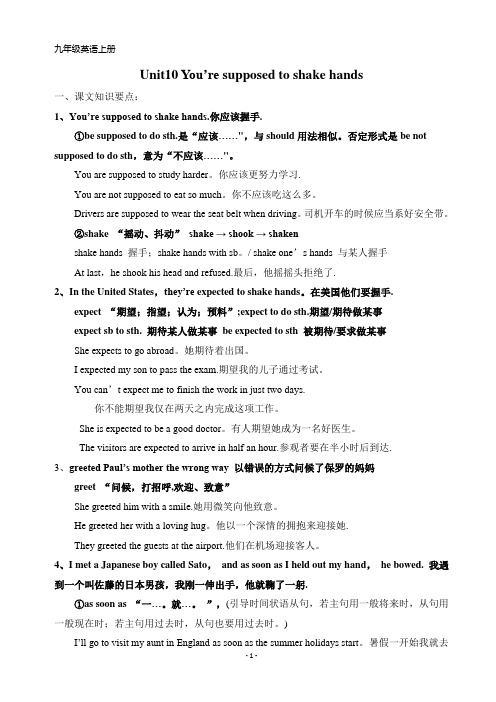
九年级英语上册Unit10 You’re supposed to shake hands一、课文知识要点:1、You’re supposed to shake hands.你应该握手.①be supposed to do sth.是“应该……",与should用法相似。
否定形式是be not supposed to do sth,意为“不应该……"。
You are supposed to study harder。
你应该更努力学习.You are not supposed to eat so much。
你不应该吃这么多。
Drivers are supposed to wear the seat belt when driving。
司机开车的时候应当系好安全带。
②shake “摇动、抖动”shake → shook → shakenshake hands 握手;shake hands with sb。
/ shake one’s hands 与某人握手At last,he shook his head and refused.最后,他摇摇头拒绝了.2、In the United States,they’re expected to shake hands。
在美国他们要握手.expect “期望;指望;认为;预料”;expect to do sth.期望/期待做某事expect sb to sth. 期待某人做某事be expected to sth 被期待/要求做某事She expects to go abroad。
她期待着出国。
I expected my son to pass the exam.期望我的儿子通过考试。
You can’t expect me to finish the work in just two days.你不能期望我仅在两天之内完成这项工作。
She is expected to be a good doctor。
人教版九年级英语(全一册)Unit10_同步话题阅读与答案详解
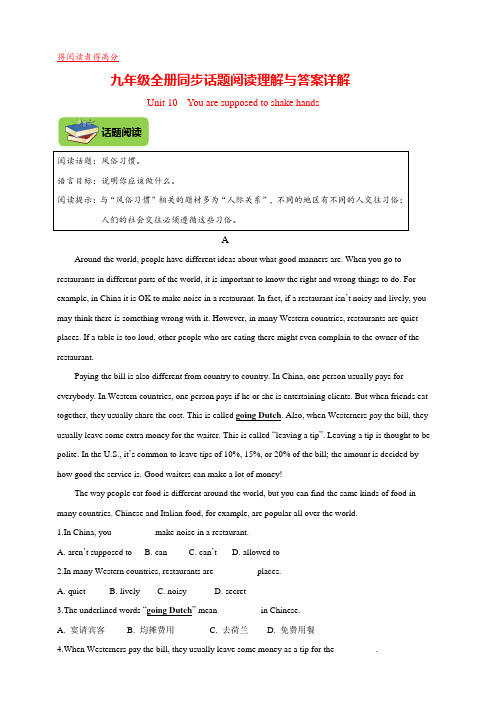
得阅读者得高分九年级全册同步话题阅读理解与答案详解Unit 10 You are supposed to shake hands话题阅读阅读话题:风俗习惯。
语言目标:说明你应该做什么。
阅读提示:与“风俗习惯”相关的题材多为“人际关系”,不同的地区有不同的人交往习俗;人们的社会交往必须遵循这些习俗。
AAround the world, people have different ideas about what good manners are. When you go to restaurants in different parts of the world, it is important to know the right and wrong things to do. For example, in China it is OK to make noise in a restaurant. In fact, if a restaurant isn’t noisy and lively, you may think there is something wrong with it. However, in many Western countries, restaurants are quiet places. If a table is too loud, other people who are eating there might even complain to the owner of the restaurant.Paying the bill is also different from country to country. In China, one person usually pays for everybody. In Western countries, one person pays if he or she is entertaining clients. But when friends eat together, they usually share the cost. This is called going Dutch. Also, when Westerners pay the bill, they usually leave some extra money for the waiter. This is called “leaving a tip”. Leaving a tip is thought to be polite. In the U.S., it’s common to leave tips of 10%, 15%, or 20% of the bill; the amount is decided by how good the service is. Good waiters can make a lot of money!The way people eat food is different around the world, but you can find the same kinds of food in many countries. Chinese and Italian food, for example, are popular all over the world.1.In China, you _________ make noise in a restaurant.A. aren’t supposed toB. canC. can’tD. allowed to2.In many Western countries, restaurants are _________ places.A. quietB. livelyC. noisyD. secret3.The underlined words “going Dutch” mean _________ in Chinese.A. 宴请宾客B. 均摊费用C. 去荷兰D. 免费用餐4.When Westerners pay the bill, they usually leave some money as a tip for the _________.A. sellerB. waiterC. visitorD. boss5.What is the main idea of the passage?A. People have different ideas about what good manners are.B. Chinese food is popular all over the world.C. Paying the bill differs from country to country.D. It is polite to give tips to the restaurant waiters or waitresses.BThe customs in different countries are rather different.If I have dinner with a Chinese host, he always puts more food onto my plate as soon as I have emptied it. That often discomforts me greatly.I have to eat the food even if I do not want to because it is considered bad manners in the west to leave one’s food on the plate.I have also noticed that when a Chinese sits at an American’sdinner party, he often refuses the offer of food or drink though he’s in fact still hungry or thirsty.This might be good manners in China but is not in the West at all.In the United Sates, it is impolite to keep asking someone again and again or insist on his accepting something. Americans have a direct way of speaking. If they want something, they will ask for it. If not, they will say, “No,Thanks.” When an American is served with beer by host, for example, he might say, “No, thanks.I’ll take some orange juice if you have it.” That is what an American will do. So when you go to the United States, you’d better remember the famous saying: “When in Rome, do as the Romans do.”1.From this passage we can see that the writer is ___________ .A.ChineseB.AmericanC.RomanD.European2.When a Chinese host kept putting more food onto his plate, the writer felt _____.A.happyB.sadC.badD.great3.In the West, people consider it bad manners ____ .A.to refuse an offer at a dinner partyB.to keep asking someone to accept somethingC.to eat much at a dinner partyD.to ask for something directly at a dinner party4.A guest at all American’s dinner party shoul d show his politeness by___________.A.eating up all the food offeredB.putting more food onto his plate as soon as he emptied itC.refusing the offer of food or drinking though he is still hungry or thirstyD.refusing to drink anything5.“When in Rome, do as the Romans do.”means ___________ .A.the Romans are people of good mannersB.Americans always do the same things as the Romans doC.you should do things like Romans doD.you should get used to the local customs where you goCWhen we want to tell other people what we think, we can do it not only with the help of words, but also in many other ways. For example, we sometimes move our heads up and down when we want tosay“Yes”, and we move our heads from side to side when we want to say “No”.People who can neither hear nor talk to each other can communicate with the help of their fingers.People who don’t understand each other’s language have to do the same.The following story shows how they sometimes do it.An Englishman who couldn’t speak Italian was once travelling in Italy. One day he entered a restaurant and sat at a table. When the waiter came, the Englishman opened his mouth, put his fingers in it, took them out again and moved his lips. In this way he meant to say,“Bring me something to eat. ” The waiter soon brought him a cup of tea.The Englishman shook his head and the waiter understood that he didn’t want tea, so he took it away and brought him some coffeeThe Englishman was very hungry at this time and looked very sad. He was just going to leave the restaurant when another traveller come in. When this man saw the waiter, he put his hands on his stomach. That was enough. After a few minutes there was a large plate of bread and meat on the table for him..11.How do people who don’t understand each other’s language usually express themselves?A.Look for help of words.B.Move their heads.e body language.D.Move their fingers from side to side.12.What did the Englishman want the waiter to bring him?A. A cup of tea.B. A cup of coffee.C. A glass of water.D. Something to eat.In this way he meant to say,“Bring me something to eat. ”可知答案应为D。
人教新目标 九年级全册英语unit10 You're supposed to shake hands

Unit10 Section B综合能力训练新词对对碰:重点词语达达标I. 根据句意及首字母或汉语提示完成单词。
1.She wants to be an e _____________student to Australia.2.The old man loves his g _____________very much and he often buys gifts for her.3.Everyone else was invited e _____________me, and I don’t know why.4.On the first day, the coach driver taught us some b _____________skills about driving.5.Lin Yue has gradually g _____________used to the life here.II. 根据中文写出单词或短语。
1.使某事感到宾至如归____________2.格外努力____________3.习惯于____________4.值得麻烦____________5.指着____________要点跟踪练:重点知识演练场I. 单项选择。
1.________it’s summer________ winter, Mount Huang is well worth visiting.A.Both; and B.Not only; but also C.Neither; nor D.Whether; or 2.—Do you know when they will hold their wedding party?—No, I don’t. Their wedding date is a ________ and nobody knows it.A.message B.secret C.suggestion D.request3.The teacher's words were encouraging and ________ me, so I decided to plan my life carefullyand have a new start.A.get on well with B.had an influence onC.took pride in D.got used to4.Today many people give out and receive ____________ red envelopes (红包)on mobile phones. A.natural B.electronic C.national D.basic5.—I don’t know what to do. I need some ___________.—No problem.A.information B.advices C.news D.suggestionsII. 从(II)中选择合适的句子补全(I)对话,有两个选项多余。
九年级英语全册 Unit 10 You are supposed to shake hands Se

Read the passage again and plete the chart. Ideas and customs about ... Colombia Switzerland being on time visiting a friend’s house making plans with friends
You are supposed to help to keep the street clean.
What are you supposed to do when someone asks you the way?
You are supposed to show the way politely.
1. In which country is it OK to be 15 minutes late for dinner? In Colombia.
2. Where is Teresa Lopez from? She is from Cali, Colombia.
3. Do people often drop by friends’ homes in Colombia? Yes, they do.
be supposed to 表示 “被期望(做)或要 求应该”, 后须接动词原形.
be supposed + to do 动词不定式
= be expected to do/ should do
eg. You are supposed to arrive on time.
人教版九年级英语全册Unit10You’resupposedtoshakehands
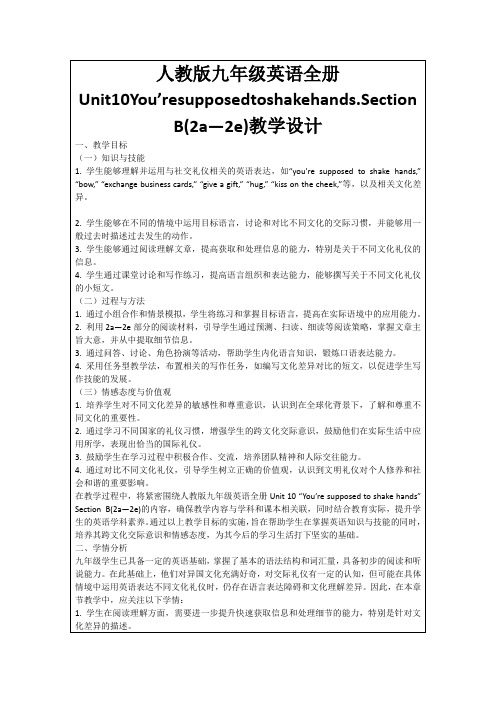
-定期进行总结性评价,检测学生对本章节知识的掌握情况。
四、教学内容与过程
(一)导入新课
为了激发学生对本节课的兴趣,教师将通过以下方式导入新课:
1.利用多媒体展示不同国家的礼仪图片,如握手、鞠躬、交换名片等,让学生观察并猜测这些行为的含义。
2.邀请学生分享他们在生活中遇到的文化差异现象,引导他们思考礼仪在不同文化背景下的重要性。
(三)情感态度与价值观
1.培养学生对不同文化差异的敏感性和尊重意识,认识到在全球化背景下,了解和尊重不同文化的重要性。
2.通过学习不同国家的礼仪习惯,增强学生的跨文化交际意识,鼓励他们在实际生活中应用所学,表现出恰当的国际礼仪。
3.鼓励学生在学习过程中积极合作、交流,培养团队精神和人际交往能力。
4.通过对比不同文化礼仪,引导学生树立正确的价值观,认识到文明礼仪对个人修养和社会和谐的重要影响。
2.撰写一篇关于文化礼仪的小短文,可以选择一个你感兴趣的国家,描述其特有的礼仪习惯,要求运用一般过去时,不少于100词。
3.观看一部与国际文化交流相关的纪录片,记录下至少五个与礼仪相关的场景,并分析其文化背景,下节课与同学分享。
4.家庭作业:与家长一起探讨中国的传统礼仪和现代礼仪,了解它们在生活中的应用,并以图文并茂的形式展示出来。
2.在语言表达方面,学生需要加强一般过去时的运用,以及在实际场景中恰当使用目标语言进行交际。
3.情感态度上,学生可能对某些文化礼仪存在误解,需要引导他们树立正确的价值观,增强跨文化交际意识。
针对以上学情,本章节教学应注重激发学生的兴趣,以实际案例为切入点,引导他们主动参与课堂讨论,提高英语应用能力。同时,关注学生的个体差异,提供个性化指导,帮助他们克服语言障碍,提升文化素养。通过这样的教学策略,使学生在掌握学科知识的同时,培养其国际视野和跨文化交流能力。
九年级英语全册Unit10Youaresupposedtoshakehand笔记重点大全(带答案)

九年级英语全册Unit10Youaresupposedtoshakehand笔记重点大全单选题1、–Could you give me a few ______ on how to spend the coming summer holiday?--OK. Let me see.A.hobbiesB.knowledgeC.suggestionsD.information答案:C句意:﹣﹣你能给我一些关于如何度过即将到来的暑假的建议吗?﹣﹣好吧,让我看看吧。
hobbies兴趣;knowledge知识;suggestions建议;information消息。
根据on how to spend the coming summer holiday可知关于如何度假,这是一种建议,故选C。
2、—This room is too small. I’d like to ask for .—Sure.We have rooms available here.A.anotherB.the otherC.oneD.it答案:A句意“这个房间太小了,我想索要另一个。
-好的,我们这里有一个可用的房间”。
A.(无范围)另一个;B.(两者中)另一个;C.一个;D.它(代指上文中出现的同一个事物)。
根据句意可知,表示换一个房间,而不是上文中出现的房间;且本句话中,没有说是两者中的一个,用another,译为“另一个”,故选A。
3、Hello, Joe. I didn't _________ to see you today. I thought you were away on holiday. A.wantB.prepareC.expectD.agree答案:C句意:你好,乔。
我没预料到今天会看到你。
我以为你出去度假了。
考查动词辨析。
want 想要;prepare 准备;expect 预料,预计;agree 同意。
由“I thought you were away on holiday.”可知问句表示“没有想到会见到你”。
九年级英语全册Unit10Youaresupposedtoshakehand知识集锦(带答案)
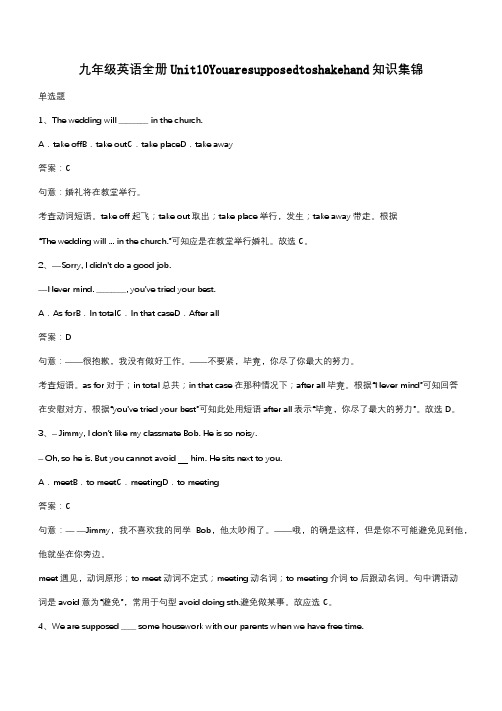
九年级英语全册Unit10Youaresupposedtoshakehand知识集锦单选题1、The wedding will ________ in the church.A.take offB.take outC.take placeD.take away答案:C句意:婚礼将在教堂举行。
考查动词短语。
take off起飞;take out取出;take place举行,发生;take away带走。
根据“The wedding will ... in the church.”可知应是在教堂举行婚礼。
故选C。
2、—Sorry, I didn't do a good job.—Never mind. ________, you've tried your best.A.As forB.In totalC.In that caseD.After all答案:D句意:——很抱歉,我没有做好工作。
——不要紧,毕竟,你尽了你最大的努力。
考查短语。
as for对于;in total总共;in that case在那种情况下;after all毕竟。
根据“Never mind”可知回答在安慰对方,根据“you've tried your best”可知此处用短语after all表示“毕竟,你尽了最大的努力”。
故选D。
3、– Jimmy, I don’t like my classmate Bob. He is so noisy.– Oh, so he is. But you cannot avoid him. He sits next to you.A.meetB.to meetC.meetingD.to meeting答案:C句意:——Jimmy,我不喜欢我的同学Bob,他太吵闹了。
——哦,的确是这样,但是你不可能避免见到他,他就坐在你旁边。
meet遇见,动词原形;to meet动词不定式;meeting动名词;to meeting介词to后跟动名词。
洛阳市九年级英语全册Unit10Youaresupposedtoshakehands题型总结及解题方
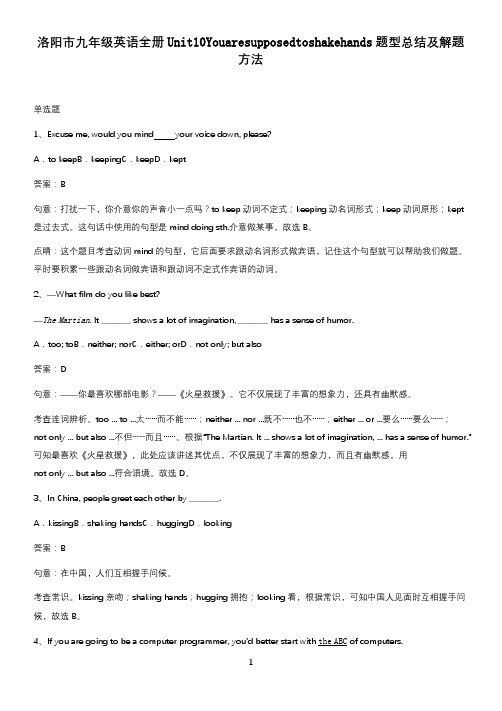
洛阳市九年级英语全册Unit10Youaresupposedtoshakehands题型总结及解题方法单选题1、Excuse me, would you mind your voice down, please?A.to keepB.keepingC.keepD.kept答案:B句意:打扰一下,你介意你的声音小一点吗?to keep动词不定式;keeping动名词形式;keep动词原形;kept 是过去式。
这句话中使用的句型是mind doing sth.介意做某事,故选B。
点睛:这个题目考查动词mind的句型,它后面要求跟动名词形式做宾语,记住这个句型就可以帮助我们做题。
平时要积累一些跟动名词做宾语和跟动词不定式作宾语的动词。
2、—What film do you like best?—The Martian. It ________ shows a lot of imagination, ________ has a sense of humor.A.too; toB.neither; norC.either; orD.not only; but also答案:D句意:——你最喜欢哪部电影?——《火星救援》。
它不仅展现了丰富的想象力,还具有幽默感。
考查连词辨析。
too ... to ...太……而不能……;neither ... nor ...既不……也不……;either ... or ...要么……要么……;not only ... but also ...不但……而且……。
根据“The Martian. It ... shows a lot of imagination, ... has a sense of humor.”可知最喜欢《火星救援》,此处应该讲述其优点,不仅展现了丰富的想象力,而且有幽默感,用not only ... but also ...符合语境。
故选D。
3、In China, people greet each other by ________.A.kissingB.shaking handsC.huggingD.looking答案:B句意:在中国,人们互相握手问候。
洛阳市九年级英语全册Unit10Youaresupposedtoshakehands经典大题例题

洛阳市九年级英语全册Unit10Youaresupposedtoshakehands经典大题例题单选题1、Neither Jim nor Tom _______ Australia before, but they know the country very well.A.has gone toB.has been toC.have gone toD.have been to答案:B句意:Jim和Tom以前都没有去过澳大利亚,但是他们对那个国家非常了解。
考查现在完成时和主谓一致。
has gone to去了某地,主语为第三人称单数;has been to去过某地,主语是第三人称单数;have gone to去了某地,主语为第一人称或者是复数;have been to去过某地,主语为第一人称或者是复数。
根据句意可知,这里表示“去过某地”,先排除A和C。
主语是有Neither…nor连接的,谓语动词的单复数形式应根据就近原则,与Tom一致,用单数,故选B。
2、--Alice , would you like to go hiking with us?--What a pity! I am free every day today.A.forB.exceptC.besidesD.among答案:B句意:--Alice,请你和我们一块徒步旅行好吗?--真遗憾,除了今天之外,我每天都有空。
考查介词的用法。
A.for后跟时间段;B. except除了,在整体当中去除一部分;C. besides除了什么之外,还有;D. among在三者或三者以上之间。
本题意思是说除了今天没空,其它都有空,也就是指的是“在整体当中去除的意思”,except正是此意;故选B。
3、The boy found ________ easy to fly kites.A.thatB.itC.thisD.it’s答案:B句意:这个男孩发现放风筝很容易。
Unit10Youresupposedtoshakehands原文与翻译
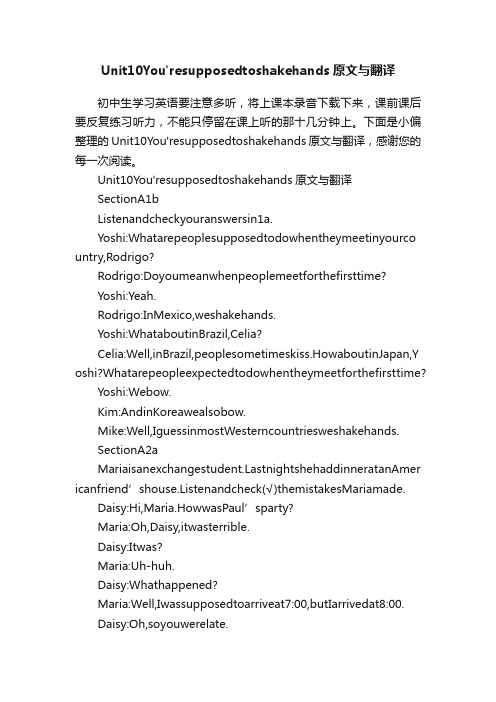
Unit10You'resupposedtoshakehands原文与翻译初中生学习英语要注意多听,将上课本录音下载下来,课前课后要反复练习听力,不能只停留在课上听的那十几分钟上。
下面是小偏整理的Unit10You'resupposedtoshakehands原文与翻译,感谢您的每一次阅读。
Unit10You'resupposedtoshakehands原文与翻译SectionA1bListenandcheckyouranswersin1a.Yoshi:Whatarepeoplesupposedtodowhentheymeetinyourco untry,Rodrigo?Rodrigo:Doyoumeanwhenpeoplemeetforthefirsttime?Yoshi:Yeah.Rodrigo:InMexico,weshakehands.Yoshi:WhataboutinBrazil,Celia?Celia:Well,inBrazil,peoplesometimeskiss.HowaboutinJapan,Y oshi?Whatarepeopleexpectedtodowhentheymeetforthefirsttime?Yoshi:Webow.Kim:AndinKoreawealsobow.Mike:Well,IguessinmostWesterncountriesweshakehands.SectionA2astnightshehaddinneratanAmer icanfriend’shouse.Listenandcheck(√)themistakesMariamade.Daisy:Hi,Maria.HowwasPaul’sparty?Maria:Oh,Daisy,itwasterrible.Daisy:Itwas?Maria:Uh-huh.Daisy:Whathappened?Maria:Well,Iwassupposedtoarriveat7:00,butIarrivedat8:00.Daisy:Oh,soyouwerelate.Maria:Yeah,butinmycountry,it’sdifferent.Whenyou’reinvit edfor7:00,you’reexpectedtocomelater!It’sconsideredstranget oturnupontime.Daisy:Isee.Maria:ThenwhenImetPaul’smom,Ikissedher.Daisy:Oh…youweresupposedtoshakehandsinstead.Maria:That’sright.AndIworeafanc ydress.Daisy:What’swrongwiththat?Maria:Well,itturnedoutthatitwasanoutdoorparty,Daisy.Every oneelsewasinaT-shirtandjeans.Daisy:Iguessnexttimeyoushouldaskwhatyou’resupposedto wear.SectionA2bListenagain.Fillintheblanks.Daisy:Hi,Maria.HowwasPaul’sparty?Maria:Oh,Daisy,itwasterrible.Daisy:Itwas?Maria:Uh-huh.Daisy:Whathappened?Maria:Well,Iwassupposedtoarriveat7:00,butIarrivedat8:00.Daisy:Oh,soyouwerelate.Maria:Yeah,butinmycountry,it’sdifferent.Whenyou’reinvit edfor7:00,you’reexpectedtocomelater!It’sconsi deredstranget oturnupontime.Daisy:Isee.Maria:ThenwhenImetPaul’smom,Ikissedher.Daisy:Oh…youweresupposedtoshakehandsinstead.Maria:That’sright.AndIworeafancydress.Daisy:What’swrongwiththat?Maria:Well,itturnedoutthatitwasanoutdoorparty,Daisy.EveryoneelsewasinaT-shirtandjeans.Daisy:Iguessnexttimeyoushouldaskwhatyou’resupposedto wear.SectionA2dRoleplaytheconversation.Howwasthewelcomepartyforforeignstudentslastnight?Great!Imadesomenewfriends.Butafunnythinghappened.What?ImetaJapaneseboycalledSato,andassoonasIheldoutmyhand, hebowed.That'showpeopleinJapanareexpectedtogreeteachother.It'sim politeifyoudon'tbow.Ididn'tknowthat.SoIjuststoodtherewithmyhandout.Finally,Ire turnedthebow.IrememberwhenlfirstmetMarielastyear,Ididthesamething.Ihe ldoutmyhandandtomysurprise,shekissedmeonbothsidesofmyfac e!Iwouldn'tmindthat!terlfoundoutFrenchpeoplearesupposedtokissw hentheyseeeachother.SectionA3aReadthefollowingopinionsofaColombianandaSwissstudent.I nwhichcountryisitOKtobe15minuteslatefordinner?TeresaLopezCall.ColomblaWhereI’mfrom,we’reprettyrelaxedabouttime.Wedon’tlik etorusharound,sowedon’tmindifpeoplearealittlelatesometimes.Ifyoutellafriendyou’regoingtotheirhousefordinner,it’sOKif youarriveabitlate.Weliketoenjoyourtimeslowly.Wevaluethetimew espendwithourfamilyandfriendsinoureverydaylives.Weoftenjustdropbyourfriendshomesifwehavetime.Wedon’tusuallyhavetomakeplanstomeetourfriends.Whenweseeeachoth er,it’spoliteforboystoshakehandsandforgirlstokisseachotheront hesideoftheface.Weoftenjustwalkaroundthetowncenter,seeingasmanyofourfr iendsaswecan!Marcleblanclausanne.SwitzerlandInSwitzerland,it’sveryimportanttobeontime.We’rethecapi talofclocksandwatches,afterall!Ifsomeoneinvitesyoutomeethimo rheratnoon,thenyou’reexpectedtobethereatnoon.Ifyou’reeven15minuteslate,y ourfriendmaygetmad.SoImake anefforttobeontimewhenImeetmyfriends.Ialwaysleavethehousee arlytoavoidheavytrafficbecauseIthinkit’simpolitetokeepothersw aiting.Also,wenevervisitafriend’shousewithoutcallingfirst.Wealmo stalwaysmakeplanstoseefriends.Weusuallyplantodosomethingin teresting,orgosomewheretogether.SectionB1bSteveisgoingtoChinatostudy.HisfriendYangMingistellinghim aboutthetablemannersinChina.Listenandnumberthepicturesinth eorderyouhearthem.YangMing:YoumustbeexcitedaboutleavingforChinatomorro w,Steve!Steve:Yeah,butI’malittlenervous,too.YangMing:Why?Steve:Well,foronething,Idon’tknowhowtousechopsticksver ywell…andIdon’tknowhowtobehaveatthedinnertable.YangMing:Oh,Isee.Well,oneimportantthingisthatyou’renots upposedtostarteatingfirstifthereareolderpeopleatthetable.Steve:That’sinteresting.IntheUnitedStates,itdoesn’tmatter.YangMing:Yeah,Iknow.It’salsoimpolitetostickyourchopsticksintoyourfood.Youshouldn’tpointatanyonewithyourchopsticks, either.Steve:Oh,OK.YangMing:Oh,andthere’sonemorethingyouneedtoknow.Yo u’renotsupposedtotalkwhenyou’reeatingdinner.Onlyparentsa reexpectedtotalkatthedinnertable.Childrenarenotallowedtospea k.Steve:Wow!That’s…that’sunusual!YangMing:Haha,I’mjustkidding!SectionB1cListenagain.Matchthesesentenceparts.YangMing:YoumustbeexcitedaboutleavingforChinatomorro w,Steve!Steve:Yeah,butI’malittlenervous,too.YangMing:Why?Steve:Well,foronething,Idon’tknowhowtousechopsticksver ywell…andIdon’tknowhowtobehaveatthedinnertable.YangMing:Oh,Isee.Well,oneimportantthingisthatyou’renots upposedtostarteatingfirstifthereareolderpeopleatthetable.Steve:That’sinteresting.IntheUnitedStates,itdoesn’tmatter.YangMing:Yeah,Iknow.It’salsoimpolitetostickyourchopstick sintoyourfood.Youshouldn’tpo intatanyonewithyourchopsticks, either.Steve:Oh,OK.YangMing:Oh,andthere’sonemorethingyouneedtoknow.Yo u’renotsupposedtotalkwhenyou’reeatingdinner.Onlyparentsa reexpectedtotalkatthedinnertable.Childrenarenotallowedtospea k.Steve:Wow!That’s…that’sunusual!Yang Ming:Haha,I’mjustkidding!Readtheletterandanswerthequestions.DearLaura,Thanksforyourmessage.Yes,I’mhavingagreattimeonmystudentexchangeprograminFrance.IwasabitnervousbeforeIar rivedhere,buttherewasnoreasontobe.Myhostfamilyisreallynice.Th eygooutoftheirwaytomakemefeelathome.Thegrandmotherknow sthatImissChinesefoodalot.SosheactuallylearnedhowtomakeChi nesefood!Shealsohasateenagegranddaughteraboutmyagewhois reallykind.ShealwaystalkstomeinFrenchtohelpmepractice.Youwo uldn’tbelievehowquicklymyFrenchhasimprovedbecauseofthat.I’mverycomfortablespeakingFrenchnow.AlthoughIstillmak elotsofmistakes,itdoesn’tworrymeasitusedto.Mybiggestchallengeislearninghowtobehaveatthedinnertabl e.Asyoucanimagine,thingsareverydifferentfromthewaytheyareat home.Forexample,you’renotsupposedtoputyourbreadonyourpl ate.You’resupposedtoputitonthetable!Ithoughtthatwasprettyst rangeatfirst,butnowI’musedtoit.Anotherexampl eisthatyou’renotsupposedtoeatanythingwit hyourhandsexceptbread,notevenfruit.Youhavetocutitupandeatit withafolk.Anotherthingisthatitisimpolitetosayyou’refull.Ifyoudo n’twantanymorefood,youshouldjustsay,“Thatwasdelicious.”Al so,you’renotsupposedtoputyourelbowson thetable.Ihavetosayt hatIfinditdifficulttoremembereverything,butI’mgraduallygettingusedtoit.Idon’tfindFrenchcustoms sostrangeanymore,I’llwriteagainsoonandtellyoumoreaboutmylifeinFrance.Hopeyou’rehavingagoodschoolyear.Yours,LinYue翻译:凯蒂:昨晚为留学生举办的欢迎派对怎么样?约翰:真棒!我交了一些新朋友,不过发生了一件很有趣的事情。
九年级英语全册Unit10Youaresupposedtoshakehand易混淆知识点(带答案)

九年级英语全册Unit10Youaresupposedtoshakehand易混淆知识点单选题1、—It’s rude to ______ your chopsticks _____ your food while having dinner.—I’m sorry. I won’t do that again.A.stuck; intoB.sticking; ontoC.stick; intoD.stick; for答案:C句意:——吃饭时把筷子插入食物中很粗鲁。
——抱歉,我不会再这样做了。
考查动词词组。
stick刺,动词原形;sticking 现在分词形式;stuck过去分词形式;into到……里面;onto 在……上;for为了。
由句意可知,本题考固定短语stick…into…插入,深入;be rude to do sth.粗鲁地做某事,所以stick用原形。
故选C。
2、There is a knock at the door. It________my mom. It’s time for her to be back home.A.may beB.may not beC.must beD.mustn’t be答案:C句意:有人敲门,一定是妈妈.该是她回家的时候了。
考查情态动词。
may be 可能是;may not be可能不是;must be一定是;mustn’t be一定不是。
由题干的最后一句可知,说话人猜测敲门人的把握很大,因此只有must be 符合本题意思,故答案选C。
3、This food is free. You don’t have to ______it.A.pay forB.look forC.ask forD.wait for答案:A句意:这食物是免费的,你不需要付钱。
本题考查动词短语的辨析。
A.pay for“支付”;B.look for“寻找”;C.ask for“请求”;D.wait for“等待”。
人教版初中英语九年级全册Unit10You’resupposedtoshakehands
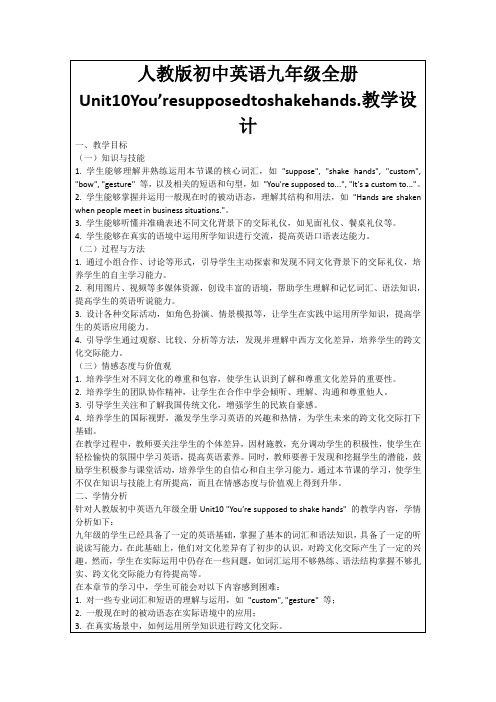
一、教学目标
(一)知识与技能
1.学生能够理解并熟练运用本节课的核心词汇,如"suppose", "shake hands", "custom", "bow", "gesture"等,以及相关的短语和句型,如"You're supposed to...", "It's a custom to..."。
4.教学评价:
-教师采用多元化的评价方式,如课堂表现、作业完成情况、实践活动参与度等;
-学生参与评价,反思自己的学习过程,提高自我监控和自主学习能力;
-教师根据评价结果,调整教学策略,以提Biblioteka 教学质量。四、教学内容与过程
(一)导入新课
在这一环节中,我将通过以下步骤引导学生进入新课的学习:
1.利用多媒体展示不同国家的见面礼仪图片,如中国人握手、日本人鞠躬、西方人拥抱等,激发学生的好奇心。
-一般现在时的被动语态的构成和用法;
-不同文化背景下的交际礼仪知识。
2.难点:
-在实际语境中灵活运用核心词汇和短语;
-准确运用一般现在时的被动语态进行表达;
-理解并尊重不同文化背景下的交际礼仪,进行有效的跨文化交际。
(二)教学设想
1.课前准备:
-教师准备相关的图片、视频等多媒体资源,以便在课堂上创设丰富、真实的语境;
(二)过程与方法
1.通过小组合作、讨论等形式,引导学生主动探索和发现不同文化背景下的交际礼仪,培养学生的自主学习能力。
2.利用图片、视频等多媒体资源,创设丰富的语境,帮助学生理解和记忆词汇、语法知识,提高学生的英语听说能力。
九年级英语全册Unit10Youaresupposedtoshakehand常考点(带答案)

九年级英语全册Unit10Youaresupposedtoshakehand常考点单选题1、Excuse me, would you mind your voice down, please?A.to keepB.keepingC.keepD.kept答案:B句意:打扰一下,你介意你的声音小一点吗?to keep动词不定式;keeping动名词形式;keep动词原形;kept是过去式。
这句话中使用的句型是mind doing sth.介意做某事,故选B。
点睛:这个题目考查动词mind的句型,它后面要求跟动名词形式做宾语,记住这个句型就可以帮助我们做题。
平时要积累一些跟动名词做宾语和跟动词不定式作宾语的动词。
2、It is wise ______Linda to make up her mind _______to play an instrument.A.for ; learningB.for ; to learnC.of ; learningD.of ; to learn答案:D句意:琳达下决心学习一种乐器是明智的。
考查固定句型。
本句是固定句型“It + be + adj. for (of) sb. to do sth.某人做某事……”结构,of 用于指某人的性格、属性、特征等,介词for表示对象,意为“对……来说”。
句中wise(明智的)是描述Linda的特点,需用of,可排除前面两项。
make up one's mind to do sth.下决心做某事,固定短语;根据句意结构和语境,可知选D。
3、When you’re invited to have dinner at home by an American friend, you should be ________ or a little later. It’s diffe rent from our Chinese custom.A.on timeB.on businessC.on showD.on way答案:A句意:当你被美国朋友邀请到家里吃饭时,你应该准时或稍晚一点。
2023九年级英语全册Unit10You'resupposedtoshakehands单元话题写作_

巧衔接 在介绍具体的礼仪时,应注意用连词and, besides, but, what’s more等衔 接。
答案
4.ACDB
【学以致用】 文明礼貌从我做起,从现在做起,从点滴小事做起。请根据下面的提示和要求,以
"When to Say Thank You"为题,写一篇短文。 提示:(1)When should we say "thank you" at home? (2)When are we supposed to say "thank you" at school? (3)... 要求: (1)短文须包括提示中的两个要点和一个补充要点,可适当发挥; (2)短文中不要出现真实的地名、校名和人名; (3)词数80左右。(开头已给出,不计入总词数) When to Say Thank You It’s polite to say "thank you" when others help us or say something kind to us.
【范文赏读】 Dear Tom,
I’m going to tell you something about the table manners in China. First, you are not supposed to stick your chopsticks into your food. And you shouldn’t point at anyone with your chopsticks. Besides, it’s rude to speak loudly at table. I think it’s good to wipe your mouth with the napkin after you take a drink. And it’s polite to thank the hostess for the food. I hope you can find my advice helpful, and I hope you will have a great time in China.
九年级英语全册Unit10Youaresupposedtoshakehand必考考点训练(带答案)
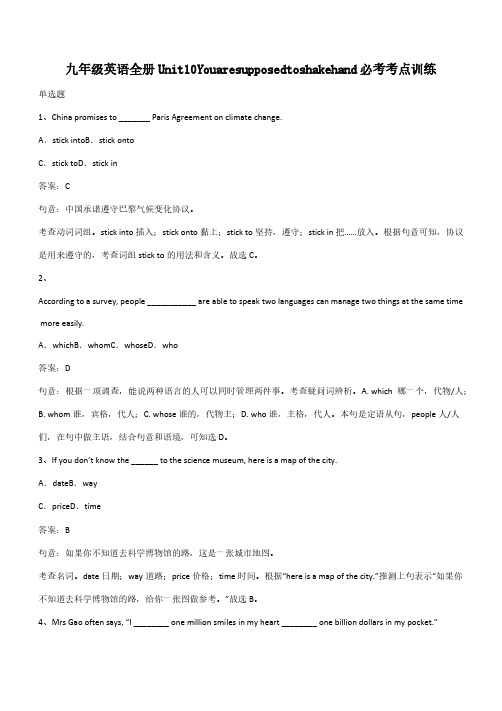
九年级英语全册Unit10Youaresupposedtoshakehand必考考点训练单选题1、China promises to _______ Paris Agreement on climate change.A.stick intoB.stick ontoC.stick toD.stick in答案:C句意:中国承诺遵守巴黎气候变化协议。
考查动词词组。
stick into插入;stick onto黏上;stick to坚持,遵守;stick in 把……放入。
根据句意可知,协议是用来遵守的,考查词组stick to的用法和含义。
故选C。
2、According to a survey, people ___________ are able to speak two languages can manage two things at the same time more easily.A.whichB.whomC.whoseD.who答案:D句意:根据一项调查,能说两种语言的人可以同时管理两件事。
考查疑问词辨析。
A. which哪一个,代物/人;B. whom谁,宾格,代人;C. whose谁的,代物主;D. who谁,主格,代人。
本句是定语从句,people人/人们,在句中做主语,结合句意和语境,可知选D。
3、If you don’t know the ______ to the science museum, here is a map of the city.A.dateB.wayC.priceD.time答案:B句意:如果你不知道去科学博物馆的路,这是一张城市地图。
考查名词。
date日期;way道路;price价格;time时间。
根据“here is a map of the city.”推测上句表示“如果你不知道去科学博物馆的路,给你一张图做参考。
”故选B。
4、Mrs Gao often says, “I ________ one million smiles in my heart ________ one billion dollars in my pocket.”A.don’t like; butB.prefer; thanC.would rather; thanD.prefer; to答案:D句意:高老师经常说:“我宁愿心存100万个微笑,也不愿兜里装有100万美元。
- 1、下载文档前请自行甄别文档内容的完整性,平台不提供额外的编辑、内容补充、找答案等附加服务。
- 2、"仅部分预览"的文档,不可在线预览部分如存在完整性等问题,可反馈申请退款(可完整预览的文档不适用该条件!)。
- 3、如文档侵犯您的权益,请联系客服反馈,我们会尽快为您处理(人工客服工作时间:9:00-18:30)。
The Third Period—Section B(1a-1d)
Teaching Important Points 【教学重点】
Key words & phrases:
stick…into,point at
2.In China,you're not supposed to stick your chopsticks into the food.
3.In Korea,the youngest person is expected to start eating first.
4.In China,it's impolite to use your chopsticks to hit an empty bowl.
;
It's+adj.+to do sth.;you should/shouldn't do sth.
eg:It's impolite to use your chopsticks to hit an empty bowl.
You shouldn't start eating first if there are older people at the table.
Teaching Difficult Points 【教学难点】
★Understand the structures and use them in the listening and speaking practice.
You're not supposed to stick your chopsticks into the food.
Teaching Aids 【教学工具】
A tape recorder,CAI or multimedia courseware.
Teaching Steps 【教学过程】
★Step 1Leading in 【新课导入】
1.Greeting
2.Brainstorming
Interview individual students,like this:
T:If an exchange student comes to our school,what is your advice to him/her?
Remind them of the six points in 4c,Section A.
3.Practice with more students.
★Step 2Cooperative inquiry 【合作探究】
1.Finish the task in 1a
①Talk about table manners in China with the class.
②Read the sentences in t he frame.Students choose T or F.The teacher shows some pictures to help them.
③Students read aloud the statements that are true.
2.Finish the task in 1b
①Look at the pictures in 1b.Discuss them.Get the students to describe the pictures,using the structures they have learned.
What is wrong with the pictures?
②Listen to the recording and number the pictures in the order they hear.
③Ask students to say the expressions about the wrong points.
3.Finish the task in 1c
Play the recording for the second time.Students match the sentence parts.
4.Finish the task in 1d
★Step 3Homework
1.Search for the eating manners in America on the Internet.
2.Write down the eating manners in China.
3.Translate the following sentences into English.
(1)用筷子指着别人是不礼貌的。
________________________________________________________________________
(2)如果有年长者在餐桌旁边,小孩子不应该先开始吃饭。
________________________________________________________________________
(3)你不应该将筷子插进食物里。
________________________________________________________________________
Board Design 板书设计
Unit 10 You're supposed to shake hands.
Section B(1a-1d)
stick…into,point at/to
be supposed/expected to do sth.;
It's+adj.+to do sth.;you should/shouldn't do sth.
It's impolite to use your chopsticks to hit an empty bowl.
You shouldn't start eating first if there are older people at the table.
Teaching Reflection 【教学反思】
In this period,the students should try to express the eating manners in different countries.The teacher should get the students to practice the key structures—be supposed to;should/shouldn't;it's impolite to do sth.—in listening and speaking.They will improve their capacity of language organization and oral output while listening and speaking practice.The teacher should get them to do enough listening and oral practice before they can write some sentences.
We can ask them to surf the Internet to search for the information about manners in foreign countries.It's useful to do that.。
